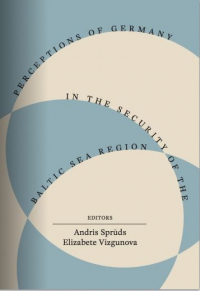Gateway to Think Tanks
| 来源类型 | Publications - External Publications - External Book Chapters |
| 规范类型 | 其他 |
| DOI | 978-9934-567-27-8 |
| The Wider Context: Germany's Baltic Engagement, the ‘Munich Consensus’ and the Future of European Security In: Perceptions of Germany in the Security of the Baltic Sea Region, 2018/ Ed. By Andris Sprüds, Elizabete Vizgunova. – Riga: Latvian Institute of International Affairs, 2018 | |
| Barbara KUNZ | |
| 发表日期 | 2018-10-16 |
| 出版年 | 2018 |
| 概述 | Due to its size and economic and political weight in Europe, Germany is an important actor in the Baltic Sea Region (BSR). Berlin has chosen to play an active role: the Bundeswehr’s presence in Lithuania as part of NATO’s Enhanced Forward Presence (eFP), but also proposals pertaining to... |
| 摘要 |
The Wider Context: Germany's Baltic Engagement, the ‘Munich Consensus’ and the Future of European Security In: Perceptions of Germany in the Security of the Baltic Sea Region, 2018/ Ed. By Andris Sprüds, Elizabete Vizgunova. – Riga: Latvian Institute of International Affairs, 2018
Due to its size and economic and political weight in Europe, Germany is an important actor in the Baltic Sea Region (BSR). Berlin has chosen to play an active role: the Bundeswehr’s presence in Lithuania as part of NATO’s Enhanced Forward Presence (eFP), but also proposals pertaining to Baltic Sea Cooperation within the Council of the Baltic Sea States, of which Germany is a founding member, are examples of German engagement in the region. Beyond the regional dimension, however, Germany’s engagement in the BSR needs to be seen in the wider context of German foreign, security and defence policy.
 In this wider context, 2014 is a watershed year – with a double meaning. Conclusions drawn from Russia’s illegal annexation of Crimea in March that year led to a change of paradigm in German approaches vis-à-vis Moscow. Even earlier that year, high-ranking officials laid out what was sometimes labelled the ‘Munich consensus’ on security policy at the Munich Security Conference: Germany would assume greater responsibility for international security and stability. Since then, there have been considerable evolutions in German discourses and policies: the new approach needed to be translated into actual engagement on the international scene. This was (and continues to be) accompanied by measures at domestic level. Germany decided to increase the country’s defence budget. Moreover, a new ‘White Paper on Security and Defence and the Future of the Bundeswehr’ replaced its decade-old and outdated predecessor in July 2016.
Against this background, Germany’s engagement in the BSR may be a test case for the general evolution of German security policy. This chapter will consequently analyse how Berlin’s action there fits into the overall context of the current German security and defence policy. What are the likely decisive factors in Germany’s engagement in the region; is Berlin intending to play the role of a ‘Baltic power’, and how is its approach linked to the wider context of German foreign and security policy?
About the bookThe book project ‘Perceptions of Germany in the Security on the Baltic Sea Region’ assembles the contributions from Sweden, Norway, Finland, Denmark, Poland, Latvia, Lithuania, Estonia, and Germany. It assesses the perceptions of Germany’s contribution to hard, soft and regional security of the Baltic Sea region. The publication also engages in a mapping exercise, pinning down the most important perception drivers – various stake-holders from public and private sector and most important security narratives – and offers recommendations.
About the chapter's authorBarbara Kunz has been Research Fellow at Cerfa since April 2015. She holds a PhD from Stockholm University/Sweden and a Master’s degree from the Institut d’Etudes Politiques de Paris. Before joining Cerfa, she spent several years working for the Centre for Baltic and East European Studies (Stockholm, Sweden), Bertelsmann Stiftung (Gütersloh, Germany) and Genshagen Foundation (Genshagen close to Berlin, Berlin) respectively. Barbara moreover stayed at the Center for Transatlantic Relations/Johns Hopkins University in Washington DC as well as at the Centre for International Affairs in Warsaw as a visiting fellow.
The book is published by the Latvian Institute of International Affairs in collaboration with the Konrad Adenauer Stiftung. It is available here: Perceptions of Germany in the Security on the Baltic Sea Region.
|
| 关键词 | European Security German defense policy German foreign policy German security policy Baltic Sea Germany |
| URL | https://www.ifri.org/en/publications/publications-ifri/chapitres-douvrages-ifri/wider-context-germanys-baltic-engagement |
| 来源智库 | French Institute of International Relations (France) |
| 引用统计 | |
| 资源类型 | 智库出版物 |
| 条目标识符 | http://119.78.100.153/handle/2XGU8XDN/416441 |
| 推荐引用方式 GB/T 7714 | Barbara KUNZ. The Wider Context: Germany's Baltic Engagement, the ‘Munich Consensus’ and the Future of European Security In: Perceptions of Germany in the Security of the Baltic Sea Region, 2018/ Ed. By Andris Sprüds, Elizabete Vizgunova. – Riga: Latvian Institute of International Affairs, 2018. 2018. |
| 条目包含的文件 | ||||||
| 文件名称/大小 | 资源类型 | 版本类型 | 开放类型 | 使用许可 | ||
| couv_perceptions_of_(29KB) | 智库出版物 | 限制开放 | CC BY-NC-SA |  浏览 | ||
除非特别说明,本系统中所有内容都受版权保护,并保留所有权利。